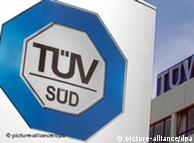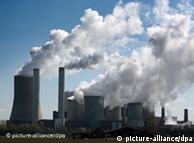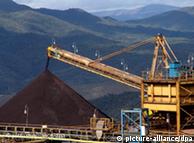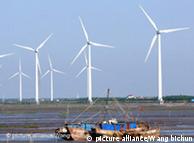CLIMATE | 01.10.2010
Conflicts of interest threaten carbon-trading mechanism
Under the Kyoto Protocol, polluters must pay for their excess greenhouse gas emissions.
One way to do this is by buying carbon credits certified by the UN's Clean Development Mechanism, which is based in Bonn.
By turning carbon into a commodity, the CDM hopes to reduce emissions by funneling money to cleaner technologies in the developing world.
But some say that a conflict of interest inherent in the CDM's rules is undermining its work.
The problem has parallels to the global financial crisis. In this case, however, the conflicted companies are not ratings agencies but the private firms that audit the carbon-reduction projects.
The auditors "have a lot of responsibility, and they don't live up to it," said Eva Filzmoser, the Brussels-based director of CDM Watch, a coalition of green groups funded by the European Climate Foundation and the International Climate Protection Initiative of Germany's Environment Ministry.
The role of auditors  TUEV SUED is well known in Germany for car checks, but it does other checks too
TUEV SUED is well known in Germany for car checks, but it does other checks too
Although the CDM was slow to ramp up after its inception about a decade ago, by 2012 it will have raised a total of around $18 billion (13 billion euros) through carbon-reduction projects in developing countries, according to a 2010 World Bank report.
This is done with the sale of carbon credits. These credits represent greenhouse gases that were not emitted, thanks to cleaner technologies.
But calculating the absence of something, instead of its presence, is not easy. For example, how do you know that a wind park wouldn't have been built anyway, because it was still profitable to do so?
It's up to independent auditors to evaluate this aspect of the proposed projects, which is known as "additionality."
If the auditor decides that the proposed project is valid, it submits the project to the Executive Board for approval. Later, other companies verify that the reduction actually took place.
 This plant can offset its footprint with certificates to cut emissions in poorer countriesSomething wrong
This plant can offset its footprint with certificates to cut emissions in poorer countriesSomething wrong
Four recent auditor suspensions hint that some have not been carrying out this task in the way that they are meant to.
For example, the board suspended Munich-based TUEV SUED, one of the largest auditors, for four months this year.
The short public document describing the suspension states that "undue pressure" may have influenced TUEV SUED's recommendations.
For some projects, it states, "a positive validation opinion was given even though (TUEV SUED) had concerns about additionality."
The violation was likely the result of a conflict of interest inherent in the carbon auditing process, said Lambert Schneider, a CDM consultant in Berlin.
The auditors' job is to uphold the standards of the CDM, but their payment comes from the development projects themselves. In fact, they have to bid against other auditors for the projects.
The auditors argue that this conflict does not affect their assessment. If they don't get it right, the board will demand a time-consuming review and their reputation will suffer.
"They're not going to try to fudge their work," said Kim Carnahan of the International Emissions Trading Association in Washington, DC, which has auditors among its members.
The worst they can do
But some say this conflict of interest is a big problem for the CDM's goals.
Auditors have been known to act as if they're "a facilitator or mediator," Schneider said, rather than an overseer. If the auditors do not satisfy the project developers, they risk losing future contracts with them.
Or possibly worse.
A project developer is suing an auditor in Chinese courts, Point Carbon News reported late September. The auditor did not recommend the developer's project under a different carbon-credit certification scheme.
Some say the situation is similar to the conflicts of interest that played a part in the recent financial crisis. Investment banks paid ratings agencies to rate the securities that they issued. As a result, the ratings agencies had an incentive to inflate the ratings.
Under the CDM, if the auditors inflate the number of carbon credits by approving non-additional projects, Schneider said, the result could actually be an increase in emissions.
"That's the worst (the auditors) can do," Filzmoser said. "I wonder how many non-additional projects were validated without (an auditor) being suspended."
Some say that TUEV SUED's suspension should be read as the CDM's warning to all the auditors.
"In my opinion, TUEV SUED is not worse than the others," said Axel Michaelowa, a founding partner of Perspectives, a carbon-markets consulting firm in Zurich owned by Point Carbon. On the same grounds, "almost all the (auditors) could have been suspended."
Disciplinary reforms Large mining and financial firms are behind many CDM emissions reduction projects
Large mining and financial firms are behind many CDM emissions reduction projects
The board is now reforming the disciplinary procedures for auditors. The reforms should help keep the companies in line by monitoring their performance more objectively and providing more options for punishment, Schneider said.
But the reforms will not address the underlying conflict of interest, say, by changing who pays the auditors or by regulating rates, as Michaelowa has advocated.
And the new procedures may not give the public much more information than the old ones about what's going wrong.
Last month, the board added a rule that the reasons behind the initiation of a disciplinary investigation would remain confidential.
That information has always been kept secret in practice, but Filzmoser and Schneider have both called for its public release in cases where the board finds that the auditor violated the rules.
Indeed, the board has little incentive to be more transparent.
The board members do not have legal immunity, so project developers could go after them for opposing a project. "They are afraid of being sued," Schneider said.
Board members plea that they are doing their best under difficult circumstances.
Attacks on the CDM seem to be coming from all sides. And with international climate negotiations stalled, the future of the entire mechanism is uncertain.
"It's undoubtedly true that we have made lots of mistakes," said board member Martin Hession at the board's September meeting, in response to general criticisms. "But that's because nobody has ever done it before."
Author: Chelsea Wald
Editor: Nathan Witkop


No comments:
Post a Comment